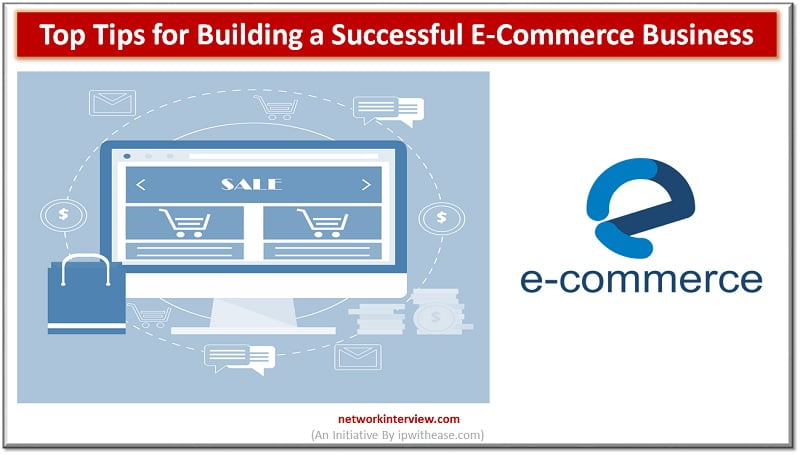
Top Tips for Building a Successful E-Commerce Business
It is a fact that small businesses form the majority of all types of commerce in America, with over 99% of all industries being classed as operated by small firms. Put simply, small businesses account for the largest part of economic output in most countries of the developed world. Only a few decades ago, e-commerce represented only a small fraction of the overall output of small businesses. This was largely because online activity and the internet had not reached the level of maturity that it enjoys today.
In the early days of the internet, bandwidth restrictions (in terms of home internet connection speeds and server capabilities) had limited the content that could be created and enjoyed online. Web pages were not as sophisticated and the level of interaction that could take place was not comparable to what is available today. As a greater proportion of the global population now has fast and reliable internet, the services provided have evolved.
In addition, there has been a rapid increase in the number of consumers who now shop online in the last ten years. This has led to explosive growth taking place in the field of e-commerce. If you are considering building an e-commerce business, this article will be of great benefit. Some of the most important top tips to build a successful e-commerce business will be described in detail.
Thorough Market Research
As a starting point for any e-commerce business, it is vitally important to have a comprehensive understanding of the market that you intend to enter and the target customer base to whom you will be selling your goods or services. A key way to gain this knowledge is by undertaking thorough market research. This will allow you to have high-quality information on the purchasing habits of your target market and what their needs and wants are when it comes to buying goods and services.
Market research can be undertaken in several ways. Online surveys can be created that are quick to complete and ask the consumer a range of questions that help to determine their preferences and purchasing habits. You can find a wide range of online customer survey platforms that will help you to make informed decisions about the nature of products and services that will be sold on your e-commerce site.
If your e-commerce company seeks more in-depth information from consumers, it can be beneficial to consider holding consumer focus groups where more qualitative data can be received. Focus groups typically take a group of the public who either represent a broad spectrum of society or are representative of the target group of consumers that the firm is planning to sell to. Regardless of the method of market research that you use, it is important to gain high-quality information that can shape your e-commerce product offerings.
A Differentiated Product or Service
After undertaking thorough market research there should be a deep awareness of the target market that your business is aiming to sell to. In addition, the needs and wants of this group should be considered when designing the products or services that your company intends to sell. It is incredibly important to ensure that your product offering is suitably differentiated from that of the competition.
Put simply, if you are selling a similar product online that is available elsewhere in more established online stores, you will have extreme difficulty in gaining a market share. The only option will be to compete on the price of the goods which can lead to a price war that does not benefit either business as it will directly impact profit margins. It makes far better economic sense to ensure that your product or service has perceived benefits that make it stand out in the increasingly crowded online marketplace.
Product differentiation allows your business to stand out in the global market and can be achieved in a variety of ways. By allowing your customers to customize their products they will be playing an integral role in creating something that is specifically tailored to their needs. Conversely, you can differentiate your whole organization by offering exceptional customer service or delivery times that are far lower than the industry standard timescales.
Harness Social Media
In 2023, all businesses need to recognize the value that social media platforms offer in terms of their promotional potential. Social media has grown exponentially since its inception a few decades ago. It is estimated that there are now 4.89 billion social media users in the world. This represents over half the total world population (which currently stands at just over eight billion people) and should indicate the power that social media channels have in daily life.
Platforms such as TikTok and Instagram can be the ideal way to promote your e-commerce business, as these channels can be targeted to reach specific consumers based on their online activity on these social media platforms. It is important to create short but memorable advertising campaigns that feature consistent brand logos and design themes so that your brand image can be built in the eyes of your target consumers.
Ideally, it is best practice to create campaigns and use a QR code generator to include hyperlinks back to the specific web page of the product or service you are promoting. This allows a seamless transition to take place from consumer awareness to generating interest and then providing an easy route for the purchase to take place.
Content Is King
For most e-commerce businesses, the company website represents one of the main consumer touchpoints. Every part of the website should be planned and designed so that consistent themes take place from page to page, and the overall image of the company stays consistent. It is of paramount importance that all content on the e-commerce website is of high-quality and promotes a professional image.
For example, product descriptions should be concise but informative and pictures or videos used to illustrate the products should be professional looking and produced in high definition. Put simply, all content that consumers see on your website will combine to produce an overall perception of your company in their minds and will play a key role in determining if they decide to purchase from your site.
In addition, all content should obey the best practices of search engine optimization (SEO). You can read more about the importance of SEO, but it should be understood that pages obeying these rules are far more likely to rank highly on organic web searches. Today’s consumers are far less likely to search through pages of search results when looking to buy a specific product or service. The majority will simply look at page 1 of the results or even just the first three top results.
APIs for Improved Customer Experience
E-commerce websites will commonly use a range of embedded applications or plugins to enable them to run effectively and offer the functionality that is demanded by today’s consumers. For example, customers expect secure checkout facilities when making online purchases so that their payment details and financial information are protected from cybercriminals.
These applications are commonly run by using application programming interfaces or APIs. APIs help websites to run multiple applications that need to communicate with each other. As the complexity of online sites grows it is important to consider using an API management platform to manage the API workflows and ensure a seamless customer experience when using your site.
Make Customer Service a Priority
In the modern world of e-commerce, customers expect to have a trouble-free shopping experience. When issues or problems do occur, they also expect that they will be solved quickly and efficiently and to their satisfaction. Poor customer service is one of the leading causes of high levels of customer churn and businesses must ensure that this is kept at an absolute minimum.
Put simply, high levels of customer churn will lower total revenue streams and will lead to the business relying on new customers rather than taking advantage of an existing customer base. The use of chatbots has become widespread across e-commerce sites in recent years. This technology can help customers to receive rapid answers to their questions and queries by directing them to relevant web pages within the website.
However, it should be recognized that not all questions can be solved using AI. When complaints are made, it is important to have human staff available who can investigate and resolve the issues promptly. This will ensure that future trade is not lost from the existing customer base.
Support A Good Cause
As a final key point for all e-commerce companies, it can be extremely beneficial to actively support a charity or good cause. Ideally, the aims and mission of this charity or cause will resonate with your target market. Many leading e-commerce companies donate a small proportion of their net profits to good causes and publicize the fact.
If your market research demonstrates that your target customers have strong views on the environment or sustainability, it can be wise to support environmental charities that seek to protect the planet. In addition, this knowledge can shape future product development, such as making goods that have a low carbon footprint or using sustainable raw materials in their construction.
In short, working with charities and good causes can help to build a positive corporate image and is another way of differentiating your e-commerce business from competitors in the marketplace.
Continue Reading:
Career in Search Engine Optimization: The Definitive Guide
Why choose Digital Marketing as a Career in 2023?



